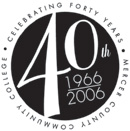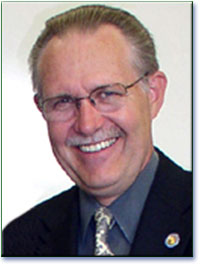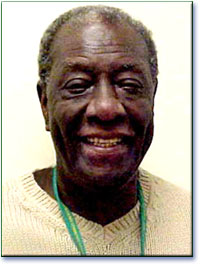| Time Line 1890 to 2006 | |
| 1890: | The Evening Drawing School opens at 120 N. Broad Street, Trenton, offering mechanical and freehand drawing. |
| 1898: | Renamed Trenton Technical School of Science and Art. 43 students are enrolled. |
| 1901: | Renamed School of Industrial Arts. |
| 1911: | Moved to the Kelsey Memorial Building, 101 West State St., Trenton. |
| 1935: | Classified as a junior technical college offering training for engineering and careers in the industry. |
| 1941: | Renamed Trenton Junior College. Credit courses offered in engineering and art. |
| 1953: | School gets right to grant associate in arts degree |
| 1958: | School gets right to grant associate in science degree |
| 1962: | NJ legislature establishes county colleges. School accredited by Middle States Association of Colleges and Secondary Schools |
| 1966: | Mercer County Community College established |
| 1967: | Trenton Junior College merges into Mercer County Community College. 19 associate degree programs and two certificate programs are offered. |
| 1968-70: | Construction of the West Windsor campus begins. MCCC earns full accreditation from the Middle States Association of Colleges and Secondary Schools. |
| 1970: | Noncredit programs begin. |
| 1972: | Dedication of the West Windsor Campus on Sept. 23. Governor William T. Cahill is guest speaker. MCCC becomes the only college in NJ to offer programs in Aviation and Pre-Mortuary Science. |
| 1975: | Dedication of the new James Kerney Campus in downtown Trenton |
| 1982: | WWFM 89.1 FM classical radio, a service from MCCC, signs on the air Sept. 6. |
| 1989: | The Gallery is built in the Communications Center and hosts its inaugural exhibit on Nov. 4. |
| 1990-91: | Addition to Engineering Science building completed, with a robotics lab, computer and drafting labs. |
| 1992: | James Kerney Campus expansion project begins. A new maintenance/funeral service building begins construction at the West Windsor campus, and the existing building is converted to house art studios and security offices. |
| 1996: | Mercer begins developing its now comprehensive website. |
| 1997: | The Virtual Campus (renamed MercerOnline) instituted. Lunchtime classes begin in downtown Trenton |
| 1999: | An addition to the Communications Center on the West Windsor Campus will house radio and television program classrooms and labs. Construction started for a new Fitness Center. |
| 2001: | Construction begins for The Conference Center at Mercer. |
| 2003-04: | Renovations to the West Windsor campus include five new classrooms in the Administration building, a remodeled tutoring center, and a new demonstration kitchen. |
| 2005: | MCCC offers 68 associate degree programs and 31 certificate programs, and enrolls more than 13,000 credit students annually. |
Mercer County Community College
Commemorates 40th Anniversary
|
Memoirs: |

|
The Educational Hub of Mercer County
for Four Decades
In 1966, when community leaders and citizens of Mercer County voted "yes" to establish Mercer County Community College, they envisioned an educational resource that would help the county grow and prosper. With great foresight and a can-do attitude, the college's early trustees formed a merger with Trenton Junior College, establishing a firm foundation for growth. Today Mercer is a comprehensive institution that offers learning opportunities for a wide cross-section of the county's population. Children, teens, traditional-age college students, the unemployed, working professionals, new immigrants, and senior citizens all find educational opportunities at Mercer.
While the college's traditional associate degree programs have grown from 19 in 1966 to 68 today, the college has also responded to the community's need for continuing education and workforce training. Registrations in these noncredit programs, which began in 1970, totaled 15,000 in the past year alone, with some 1200 courses offered.
"These programs foster professional development and personal enrichment for individuals, and workforce development through customized training and consulting services for corporations, not-for-profit organizations, businesses and government agencies," said Lynn Coopersmith, dean for Organization Development and Community Programs. "This broad range of programs and services reflects our philosophy that continuing education is a lifelong learning path to intellectual, career, occupational, and personal growth for community residents, and the road to survival and progress for our business and professional communities."
According to MCCC's Acting President Thomas N. Wilfrid, "During the past 40 years we have seen rapid changes in technology, global competition, and a more diverse workplace. We all need to adapt to such changes, to learn and to grow throughout our working lives."
At the James Kerney campus, the Career Training Institute's short-term noncredit programs prepare students for careers that are in demand. Those who want to earn their high school equivalency certificate can take classes in adult basic education, while non-native speakers can take English language classes at many levels. Youth programs prepare grade schoolers and teens for college through tutoring and enrichment activities.
For children ages 6 to 17, the college's three summer camps at the 292-acre West Windsor campus offer abundant academic and recreational choices. Even the county's smallest citizens come to Mercer for "Tiny Tot Swimming" classes in the indoor pool.
"This is a high-spirited place," said MCCC faculty member Dori Seider, who began her career at Mercer in 1971. "At Mercer we are open, supportive and democratic. We encourage everyone in the community to participate here in one way or another."
Looking ahead, Dr. Wilfrid said "Mercer's role in the future will be to remain true to our mission as a community college, responding to the needs of our county's citizens. We will continue to consolidate and improve both our traditional credit programs and our noncredit offerings, and we will expand into new areas as the need arises."
MEMOIRS
Dr. Thomas N. Wilfrid
36 years -- Vice President for Academic Affairs
 What is it like to teach math and science at a maximum security prison? Thomas N. Wilfrid's vivid memories of his early years at Mercer include working in the college's Prison Education Network. "It was a wonderful experience as a young person," he said. "I got to meet some very unusual human beings, people who, despite their flaws, demonstrated a high level of intellectual capability."
What is it like to teach math and science at a maximum security prison? Thomas N. Wilfrid's vivid memories of his early years at Mercer include working in the college's Prison Education Network. "It was a wonderful experience as a young person," he said. "I got to meet some very unusual human beings, people who, despite their flaws, demonstrated a high level of intellectual capability."
Dr. Wilfrid began his career at Mercer 36 years ago, teaching Physics and Mathematics. He had just completed his M.A. in Physics at Princeton University. He would later earn his Ph.D. from the University of Pennsylvania.
Dr. Wilfrid remembers the original MCCC campus in downtown Trenton, which occupied classroom and office space in several different buildings. "People had to walk a couple of blocks between classes," he said. "We felt very much a part of the downtown community and interacted frequently with government workers and others." When the college moved to its new campus in West Windsor, he remembered feeling a bit of isolation at first. However the new buildings and spacious grounds were a big advantage. (MCCC built a new facility in downtown Trenton which opened in 1975, and is now called the James Kerney Campus.)
Dr. Wilfrid has served in many capacities at Mercer, including acting president, vice president for Academic and Student Affairs, dean for Academic Affairs, division chair of Technology, Computers and Mathematics, and dean for Student Services.
A strong believer in serving others, Dr. Wilfrid said, "Having committed my entire career to high quality educational opportunity for all who are ready to learn, I am very proud of what Mercer County Community College accomplishes every day for the people and employers of Mercer County."
Professor David Collier
44 years -- History/Geography
 Professor David Collier, who began his career at MCCC in 1961, says today's students are not very different from those in the 1960s. "In my experience, the quality of student work today is the same as in the past… In earlier years, students were more used to reading long books for work and entertainment because they had not been brought up on television. Now perhaps students are less patient and expect things to be done quickly. Students still work hard at their courses and their jobs… They are usually polite and cheerful, and many do fine academic work. Some have overcome severe hardships to proudly earn their degrees."
Professor David Collier, who began his career at MCCC in 1961, says today's students are not very different from those in the 1960s. "In my experience, the quality of student work today is the same as in the past… In earlier years, students were more used to reading long books for work and entertainment because they had not been brought up on television. Now perhaps students are less patient and expect things to be done quickly. Students still work hard at their courses and their jobs… They are usually polite and cheerful, and many do fine academic work. Some have overcome severe hardships to proudly earn their degrees."
His memories of the early days at the West Windsor campus recall a different era. "When Dr. Richard K. Greenfield was president of the college [1966 to 1975], the West Windsor campus was built and opened for classes in 1972. In those days the area was rural, with more farms and less traffic. In this scenic setting there were now extensive playing fields and ample parking lots. The emphasis on sports included a large gym and a handsome swimming pool."
Edward Frederick,
36 years -- Dean for Evening Students, James Kerney Campus
 Some of Edward Frederick's fondest memories throughout his years at Mercer are the annual graduation ceremonies, held until 1972 at Trenton's War Memorial Building. "Everybody is there and I get to meet students' families. They so often say how much we have done for them -- how we helped them. I often hear 'You don't know what you did but now it is paying off.' It's that kind of thing that makes you feel that it's all worthwhile."
Some of Edward Frederick's fondest memories throughout his years at Mercer are the annual graduation ceremonies, held until 1972 at Trenton's War Memorial Building. "Everybody is there and I get to meet students' families. They so often say how much we have done for them -- how we helped them. I often hear 'You don't know what you did but now it is paying off.' It's that kind of thing that makes you feel that it's all worthwhile."
Frederick remembers the active sororities and fraternities of his early days at Mercer. "The Student Center was at the Hotel Hildebrecht in Trenton," he said. "Students had their banners there and were involved in many activities, such as fundraisers, dances and picnics."
During his long career at Mercer, Frederick has held a wide variety of positions, beginning with counseling and tutoring. He taught business mathematics and study skills, served as director of the Educational Opportunity Fund program and director of Student Activities, became assistant dean and director of counseling, and worked with several youth development programs.
Professor Angela McGlynn
35 years -- Psychology
 I started teaching at Mercer County Community College in January 1971. I had just received a master's degree from Temple University in Psychology and read an advertisement for a psychology instructor at Mercer. I was 22 years old and had very limited teaching experience. While at Temple University, I taught Philadelphia police recruits for the University's Center for the Advancement of Justice. I was very enthusiastic about the possibility of a college teaching career at Mercer.
I started teaching at Mercer County Community College in January 1971. I had just received a master's degree from Temple University in Psychology and read an advertisement for a psychology instructor at Mercer. I was 22 years old and had very limited teaching experience. While at Temple University, I taught Philadelphia police recruits for the University's Center for the Advancement of Justice. I was very enthusiastic about the possibility of a college teaching career at Mercer.
When I first began teaching, there was no West Windsor Campus. The faculty's offices were housed in a hotel in downtown Trenton – we were all in the same large room, desk after desk. There was little privacy to speak with students but there was lots of camaraderie given the physical set up. I was about the same age as many of the students I taught and many were older. Back then, we taught our classes in various buildings throughout the downtown area, mostly all within long walking distances.
Have students changed over the decades of my teaching? This is a bit hard to gauge given I have changed as well. In my early years of teaching, I did a lot of lecturing with discussion in my classes. However, over the years we have learned the importance of student engagement, not only from the education literature but from our more recent students as well. Whereas students in the 1970s seemed content to listen to lectures and take notes, today's students want to be more actively involved in the classroom. I see this as a very good thing in terms of the teaching and learning process.
In my first semester, I taught a young man who later became quite a prominent architect. He now builds steel and glass buildings on the west coast. When e-mail came onto the scene, he contacted me some 30 years after he had been in my class. What I most appreciated in our conversation were the values he seemed to possess. When I said how impressed I was by his "success," he said he saw his success mostly in terms of his parenting rather than in how much money he had made. Another of my very smart students went on to become a lawyer and now teaches as an adjunct for the college in the English department.
A young woman I taught perhaps 20 years ago became quite successful as a researcher in psychology. Over the years, many students have contacted me with numerous examples of very positive journeys after Mercer County Community College. One Mercer graduate contacted me to tell me how proud she was when she transferred to an excellent four-year college and took a psychology course. In that class the professor told the students that their papers would have to be done in the American Psychological Association format. Her classmates were befuddled; she ended up sharing copies of handouts she saved from my courses to help her classmates with this particular writing format.
Teaching at Mercer County Community College has been an incredible privilege for me. We are a college that cares about its students both as learners and as people. So many recent Mercer graduates, who by the way, usually do as well or better than their four-year college student peers, tell me they often wish they were back at Mercer because of the special attention they got. Mercer changes lives by giving students an opportunity to start their college careers at an affordable price. More importantly, Mercer makes it easy for students to juggle other roles and responsibilities they may have while attending college because of the flexibility of the class schedule. Most importantly, Mercer County Community College provides students with special individualized attention - attention many people need to motivate them and guide them to discover what they want to do with their lives.
Professor Dori Seider
34 years -- Education/Psychology
 "When I started at Mercer we were all in Trenton. The entire humanities faculty had offices together in the Hotel Hildebrecht. We came to work every morning and said hello to the entire faculty. It was like one big family. We did all kinds of community projects. We would come to work on Saturdays and do painting projects with students. Back then everybody did everything. I wrote a play and the students acted in the play. Whatever had to be done, we all participated. We were a community then, and we still are today. We are more spread out but we still do similar things. We still have that spirit.
"When I started at Mercer we were all in Trenton. The entire humanities faculty had offices together in the Hotel Hildebrecht. We came to work every morning and said hello to the entire faculty. It was like one big family. We did all kinds of community projects. We would come to work on Saturdays and do painting projects with students. Back then everybody did everything. I wrote a play and the students acted in the play. Whatever had to be done, we all participated. We were a community then, and we still are today. We are more spread out but we still do similar things. We still have that spirit.
"Students back then wanted to change the world. A lot of them were very aware of what was going on politically and socially. They were very good students, very concerned and conscientious. After perhaps a less engaged period, I perceive the students of today as similar to the way they were back in the 70s. They are also very serious students. They know they have to work hard to succeed in today's world."